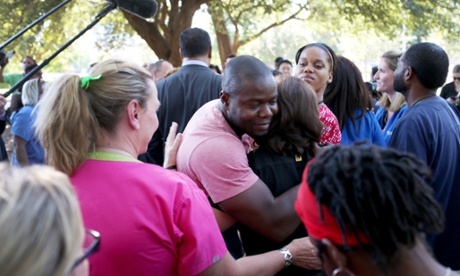Centers for Disease Control to announce new measures meant to detect signs of Ebola in passengers flying to US cities

Thomas Eric Duncan, the first person to be diagnosed with Ebola in the US, is in critical but stable condition, Texas Health Presbyterian hospital said on Tuesday. Duncan, who is being treated with the experimental drug brincidofovir, is on a ventilator to support his breathing and is receiving dialysis, the hospital said.
In a statement, the hospital said that Duncan’s liver function – which had worsened over the weekend – has improved slightly, but it warned that doctors believe “this could vary in coming days”.
Meanwhile, a hospital in Nebraska is using the same drug to treat an American journalist who contracted Ebola while covering the outbreak in Liberia. Ashoka Mukpo, a freelance cameraman who was working for NBC News, landed in Omaha on Monday, becoming the fifth American to be flown from the region to the US for treatment. In Spain, health officials announced on Monday that a nurse had become the first person to contract the virus outside of Africa.
The current outbreak has ravaged the west African countries of Liberia, Guinea and Sierra Leona, killing more than 3,400 people. It is devastating fragile healthcare systems and threatening economic stability in affected states.
On Tuesday, the head of the Centers for Disease Control and Prevention (CDC) said officials are preparing to roll out tougher Ebola screening requirements at airports this week, amid calls for a travel ban.
CDC director Tom Frieden said the public health agency would announce in the coming days new measures meant to detect signs of Ebola in passengers traveling to the US. The additional passenger screenings will be implemented at airports in the US and abroad.
Airline passengers departing the west African countries that are at the center of the outbreak already undergo temperature checks and are asked to fill out a questionnaire that asks about exposure to Ebola. As of this weekend, Frieden said these measures had stopped 77 people from boarding flights destined for US cities.
This protocol was followed in the case of Duncan, who traveled to Dallas from Liberia last month. His temperature was normal when he departed Monrovia. Duncan, however, did not disclose on the questionnaire that he had been exposed to an Ebola sufferer, his landlord’s daughter, who died from the disease hours after she was turned away from an overcrowded hospital for lack of space. Duncan helped her family transport her to the hospital, and home again.
Following Duncan’s diagnosis, some Republican lawmakers have called for blanket bans on passengers travelling from the affected parts of Africa.
Administration and healthcare officials have repeatedly said that a travel ban could exacerbate the situation in Africa by constricting the flow of aid into the region. Frieden has said isolating the region could increase the risk to other countries, including the US. “We … don’t want to do anything that will backfire,” he said.
After Duncan was diagnosed a week ago, health officials in Dallas immediately traced everyone he had come into contact with since arriving in Texas. Officials are currently monitoring 10 people who are believed to have had direct contact with Duncan, including four who were sharing an apartment with him when he became ill. Another 38 people who may have come into contact with Duncan are also being monitored, but are considered to be at much lower risk, Frieden said on Tuesday. Symptoms appear on average eight to 10 days after exposure, which means this week is a very sensitive time for the 48 people under observation. So far none have showed signs of having contracted the disease.
Hospitals across the country are also taking note of the Dallas case and ramping up their response efforts by retraining staff and refining infection control procedures.
On Tuesday, Texas health commissioner Dr David Lakey encouraged hospital staff and medical workers to be on alert for ill patients who have recently travelled to west Africa. “You can’t diagnose this disease unless you think about this disease,” Lakey said.
